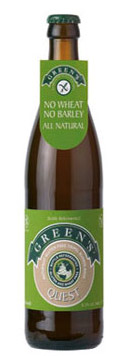 The easiest way to understand how malt and barley proved over several millennia that they are the best grains for brewing is to drink a gluten-free beer (no barley, wheat or rye).
The easiest way to understand how malt and barley proved over several millennia that they are the best grains for brewing is to drink a gluten-free beer (no barley, wheat or rye).
That sounds harsh, but it’s hard to imagine choosing to drink a beer brewed for the gluten intolerant, most often celiacs, unless you have to. Maybe our brains must register the flavors of barley or wheat before they can think “hmmm . . . beer.”
But what if you grew up in sub-Saharan Africa, where sorghum and millet are more commonly used in brewing? Then you might feel the same way about what we consider traditional beers.
That’s why I really don’t understand seeing these beers “scored” against our standards at the beer rating sites. Part of the reason, of course, is that more smaller breweries are offering them, and therefore they get classified as “craft” and that means they are supposed to be judged to a special flavor profile.
Instead consider them an acquired taste. The slightly astringent, sometimes cidery, thumbprint of sorghum becomes part of their flavor profile. And despite how unappetizing that may sound brewers are finding different ways to produce an alternative for those who are gluten intolerant, want to drink alcoholic products and don’t want to drink wine.
(Just to be clear, being gluten intolerant is not like finding yourself a little stuffed up because you are mildly allergic to yeast. Celiac disease is a genetic disorder that causes stomach cramps and digestive problems and can lead to other serious health risks.)
Now a few examples:
– The easiest to find and the easiest to drink is Anheuser-Busch Redbridge, introduced not quite a year ago. It won a gold medal at the Great American Beer Festival in the new gluten-free category and deserved it. It knocks the rough edges off the sorghum profile better than any other beer, with some toasty sweet character.
– Merchant du Vin began importing three of the various gluten-free beers that Green’s in the UK has commissioned. All three of these are brewed at DeProef in Belgium, with Quest called a tripel and Endeavor a dubbel. Both have the bright esters you’d expect from the styles, a bit of perfume and certainly candy sweetness. (In the case of Quest, which is 8.5% abv, the alcohol is also pretty apparent.) Quest is spicier, while Endeavor has more fruit and caramel. Both exhibit what a beer judge friend of my calls “extract tang” that’s more noticeable at the start than after a few sips.
– Sprecher Brewing in Milwaukee has taken another approach with Shakparo Ale and Mbege Ale. They were first brewed for Milwaukee’s African World Festival and thus styled to be African. Mbege is made with bananas as well as sorghum and millet. I haven’t had it. Sprecher brought Shakparo, made with sorghum and millet to the GABF, where it won a bronze medal. It’s fruity, with some cider characteristics that seem more integrated than in other sorghum beers.
Depending on whose numbers you look at, there are between one and three million celiacs in the United States. Breweries aren’t making these beers as a public service, but it feels more like serving a community than exploiting one. According to Information Resources Inc., A-B sold about 21,000 cases in supermarkets in the first half of 2007, less than Michelob Ultra Lime Cactus and not even 5% of Miller Chill sales.
That’s why I would call these “beers of conviction.” A few months ago I began using that term and even created a category to file posts under. Perhaps I should further define what that means, but for now I know one when I see one. And these beers brewed for those who can’t enjoy barley or wheat qualify.
1 thought on “Sometimes you can’t use the best ingredients”
Comments are closed.